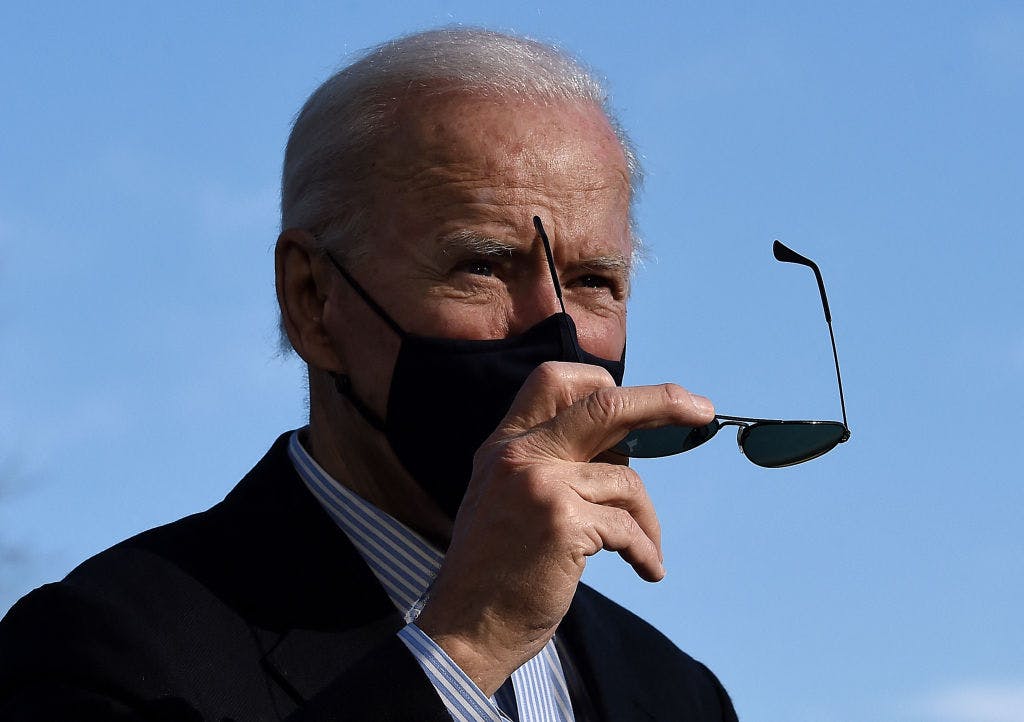|
 Oliver Douliery/Getty | |||||
| It’s been a tough week, with news of the shooting in Boulder, Colorado, arriving hard on the heels of the shooting in Atlanta. So it would be understandable if you missed pieces in The New York Times and The Washington Post, both published Tuesday, on the Biden administration’s upcoming climate push. “Biden’s Recovery Plan Bets Big on Clean Energy,” the Times declared, presenting administration officials’ comments about the infrastructure and recovery plan as a turning point:
But what exactly that means is still unclear. The actual news, apparently, is that aides this week will brief the president on “plans to invest between $3 trillion and $4 trillion in spending and tax credits on a wide range of efforts meant to bolster the economy … split between two packages, starting with an infrastructure bill that is rooted in the effort to halt the emissions of planet-warming carbon dioxide.” But the report said these officials also “stress that the details remain in flux” and “would not put a dollar figure on the amount dedicated to climate change.”
I don’t know what any of this means. I’m not sure we’re meant to know what any of this means. The only thing that seems clear here is that administration officials want people to know they’re doing something, after what the Post called “weeks of uncertainty about Biden’s second big legislative effort.” That’s great but does not necessarily constitute a “major pivot.” TNR’s Kate Aronoff is currently reporting out a piece on the climate legislation negotiations that we’ll publish at Apocalypse Soon in the coming days. To state the obvious, getting climate policy through Congress is going to be unbelievably complicated. Nick Martin wrote about one particular aspect of this Wednesday morning, looking at how Republican Senator Lisa Murkowski of Alaska essentially vetoed a nominee for deputy secretary for the Interior Department over oil issues. But Murkowski isn’t the only legislator who’s going to be tough to court. I’m questioning the optimistic reporting from the Times and Post not out of congenital pessimism, but because Ben Ehrenreich’s feature in TNR’s April issue pointed out a pattern that’s important to keep in mind when evaluating policy progress under this administration:
There’s a long and dispiriting history of climate change producing infinitely more talk than action. As Ben pointed out, “To his credit, in his first week in office, Biden went further than any of his predecessors ever had” with his drilling “pause,” rejoining the Paris Agreement, and so forth. But Biden is still leaving many options on the table—things he could do without Congress but isn’t. “Why a ‘pause’ on drilling and not an outright ban?” Ben asked. “(And why had the administration quietly gone ahead and approved 31 new drilling permits anyway?) Why no mention of fracking? … And why not immediately declare a climate emergency, which would have opened up executive powers that would enable him to evade many of the roadblocks erected by the 50 Republicans in the Senate?” This may yet prove to be a canny political strategy, the president keeping his powder dry for fights down the road. If so, though, it’s a risky one. Congressional Republicans are not known for responding to moderation with moderation, and the climate crisis is urgent enough that the ethics of keeping one’s powder dry at all are disputable. In other news, Nick sent me a bizarre and troubling story yesterday about Montana Governor Greg Gianforte (the guy who attacked a Guardian reporter in 2017). Gianforte trapped and shot a collared wolf known as “1155” near Yellowstone in February. Technically, that’s legal outside the park, although trapping is an incredibly cruel way to kill an animal. Reporter Nate Hegyi and the Mountain West News Bureau did more digging and reported on Tuesday that in fact Gianforte never bothered to complete a “state-mandated wolf trapping certification course” before doing all this, so the kill violated hunting regulations after all. I suppose with that counterexample in the back of one’s mind, there are worse things than Biden officials convincing the Times and Post that they’re taking climate change seriously. —Heather Souvaine Horn, deputy editor | |||||
| Advertising  | |||||
 | |||||
 | |||||
| Humpback whales are organizing. (Is that good news? I guess we’ll learn more as researchers figure this out.) | |||||
 | |||||
| Ocean trawling from industrial fishing apparently generates vast emissions, equal to the annual emissions of the aviation industry. | |||||
 | |||||
 | |||||
| That’s the amount of money Congressman Frank Pallone of New Jersey has received from energy and natural resource company PACs since becoming the ranking Democrat on the House Energy and Commerce Committee in 2015. You’ll want to read Kate Aronoff’s piece on this. | |||||
 | |||||
| The Intense, Lobster-Fueled Fight Over America’s First Floating Wind Farm |  | ||||
| Maine lobstermen apparently gathered in force (i.e., in around 80 boats, on the water, and peacefully, aside from three boats allegedly harassing a survey vessel) this past weekend to protest the Aqua Ventus wind project, which they worry could disrupt lobster fishing. Molly Taft at Earther does a great job of pointing out what we do and don’t know about this, as well as examining the broader history of Nimby wind project protests. There’s a lot of nuance in the piece, which closes with a pointed quote from Miriam Goldstein, director of ocean policy at the Center for American Progress:
Molly Taft | Earther | |||||
| Advertising  | |||||
 | |||||
| | |||||
| Copyright © 2021, The New Republic, All rights reserved. | |||||

